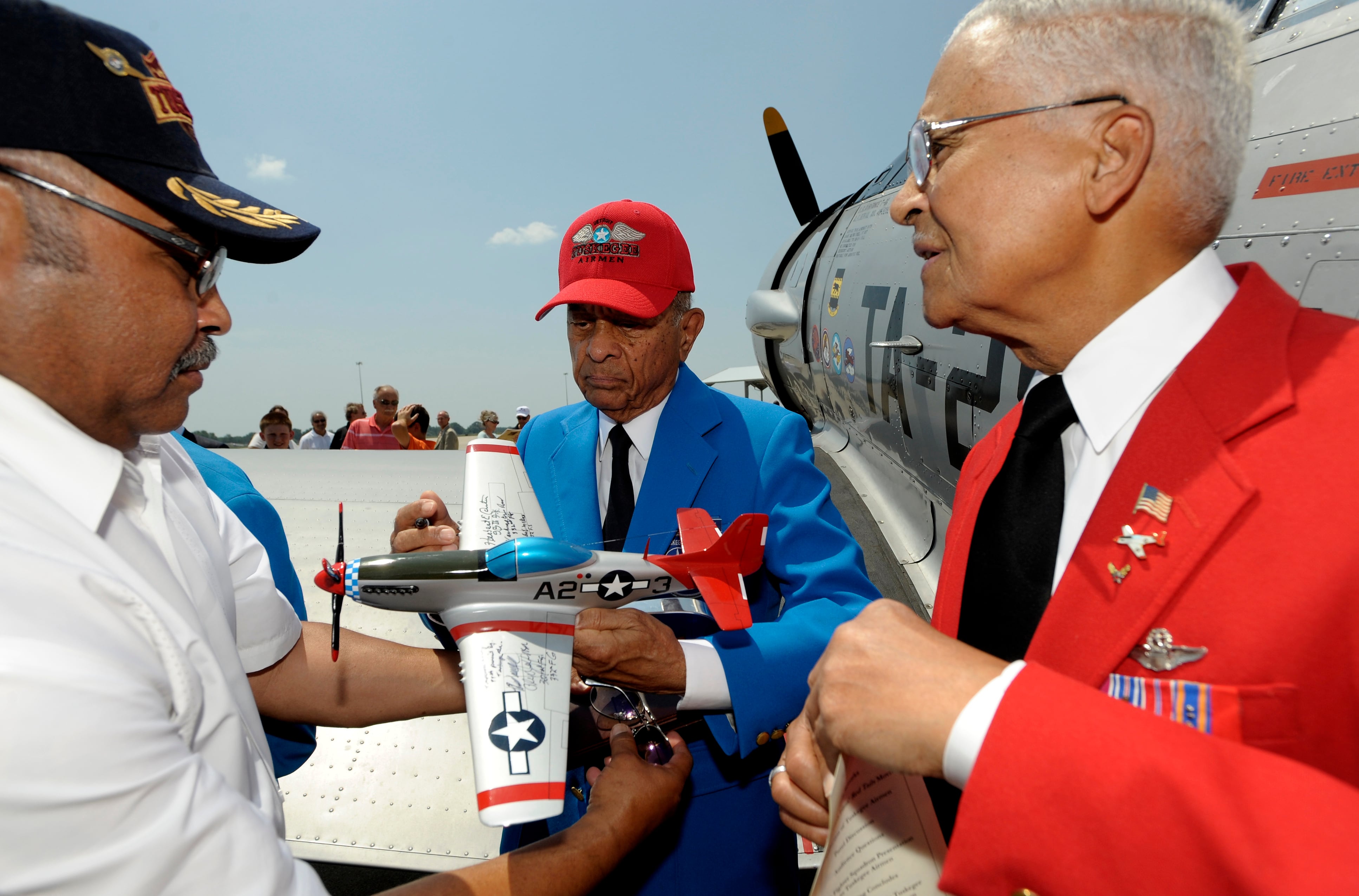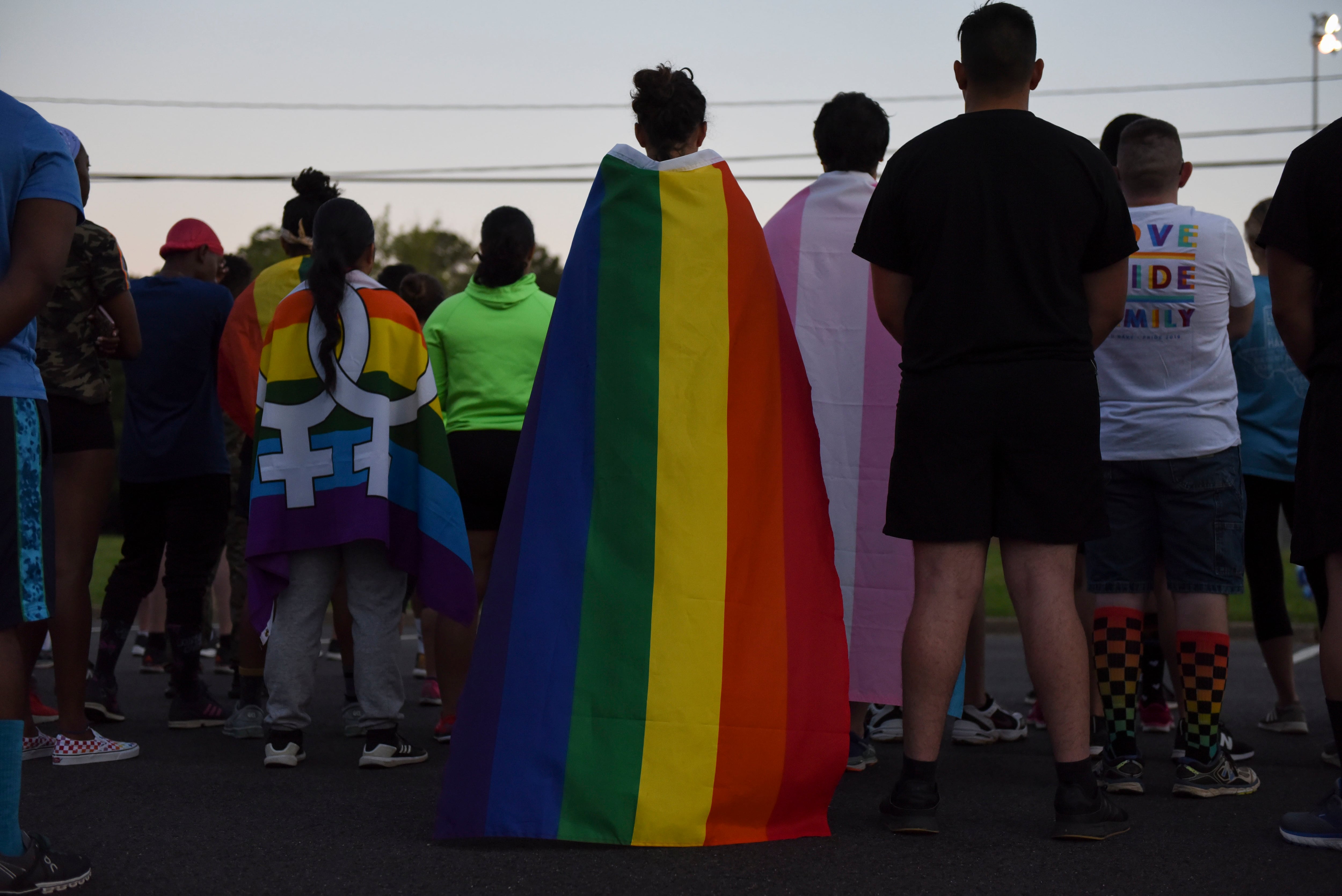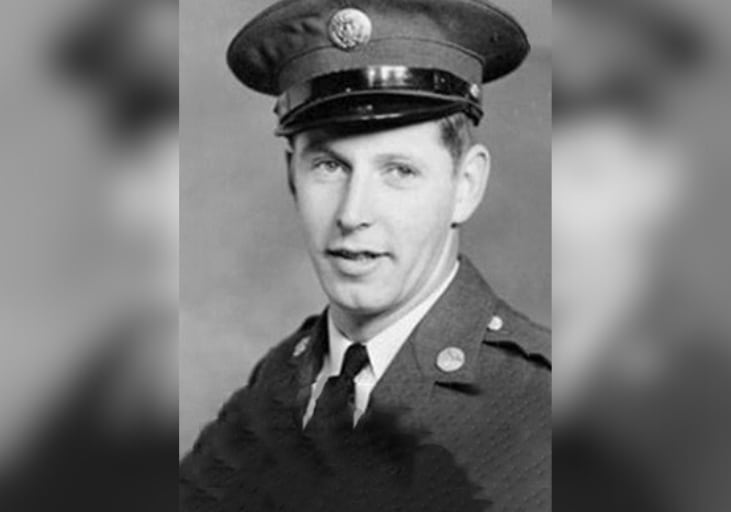In public, Richard Arthur Rahn was a Ranger-tabbed command sergeant major who attended American Legion gatherings and other ceremonies, swapped tales of combat with veterans and pressed the flesh with civic leaders.
In private, he offered comfort to a Gold Star family — visiting their Minnesota home, shedding tears with them over their fallen son, even offering a small statue of a praying soldier as a token of appreciation for their sacrifice.
In reality, he was a faker and a felon.
Rahn, 54, spent the summer attending various events while posing as a high-ranking noncommissioned officer, but when he donned his dress uniform at an Olivia, Minnesota, Legion post to greet participants in a motorcycle ride paying tribute to six fallen soldiers, the ruse was up.
Veterans spotted multiple problems with the uniform, everything from an out-of-whack ribbon rack to a Combat Infantryman Badge that would've required Korean War service. Tips came in to local law enforcement, and it soon became clear that unearned medals were the least of Rahn's problems.
Police in Willmar — a town of about 20,000 people, roughly a two-hour drive west of Minneapolis — discovered Rahn was a convicted felon in two other states, found guilty on drug and burglary charges. They also got a tip that he'd come into possession of a firearm — an illegal act for a convicted felon in Minnesota.
On Sept. 9, a month after his in-uniform appearance in Olivia and subsequent trip to the home of Greg and Kim Schmit, police entered Rahn's Willmar home with a search warrant, found a firearm and arrested him, according to a news release from the police department.
The next day, a search of a storage unit outside town uncovered two more firearms and "a U.S. Army dress uniform, with medals and insignia," the release states.
Army personnel officials confirmed to Army Times there's no record of Rahn serving in the Army, much less as a decorated NCO.
That was news to Kim Schmit, who had believed the man she'd offered dessert to and discussed religion with — the one who spoke of the 90 men lost under his command and spent an hour discussing her son, Joshua, who died in Iraq in 2007 — was who he said he was.
Or, at least, that he had been.
Seven years ago, then-Sgt. Greg Schmit was at Camp Ripley preparing alongside his Minnesota National Guard unit for deployment when officials told him of his son's death when the Humvee commanded by Sgt. Joshua Schmit hit a roadside bomb. He escorted Joshua's remains home from Dover Air Force Base, Delaware. He battled post-traumatic stress ever since, Kim Schmit said, once attempting suicide.
She knew the damage war and loss could do. She thought Rahn may have suffered service-related trauma. Her husband noticed the odd medal placement, she said, and dismissed it as the result of memory problems possibly brought on by brain injury.
The Schmits knew a nurse had visited Rahn regularly. They knew his talk of returning to Afghanistan seemed impractical and perhaps delusional. But, Kim Schmit said, "he seemed so proper and religious. And, I mean, he played it well — whatever he was doing."
Any mental issues Rahn may face or treatments he may receive were not "readily apparent" to police investigators, according to Jim Felt, Willmar's police chief.
Rahn's public defender, Jay Liedman, refused to answer questions about his client, saying in an email that none of the charges facing Rahn "involve any purported role-playing, re-enacting or other costume wearing he may or may not have been doing. I do not represent him on those types of issues, and have no information on them."
'Something's not right here'
Months before the arrest, the commander of American Legion Post 167 in Willmar got a call from Rahn, who asked about participating in the group's Memorial Day ceremonies.
Rahn identified himself as a former Ranger — "said he had 22 years in, or something," Gene Seydel recalled. "That he'd recently moved to the area."
The post welcomed him, and Rahn arrived at the ceremony in uniform — Seydel, a former airman, said he didn't recall any uniform details — and stood at attention during the speeches. He attended a post-event barbecue. He spoke with guests.
"He was nothing but polite — knew the protocol, everything," Seydel said.
That same weekend, Rahn paid a more private visit. While Greg and Kim Schmit were attending a memorial event in Washington, D.C., Kim's sister and mother were representing the family at a ceremony in the Minnesota cemetery where Joshua rests.
"My sister said this totally-in-uniform soldier came walking up and stated that he comes to our son's grave often ... and that he had left a small statue, and wanted to know if we had gotten it," Kim Schmit said. "My mom had said that he was so sincere up until he started pointing to his ribbons and almost like patting himself on the back, the type of speeches he was giving, and my mom and sister looked at each other and thought, 'Something's not right here.' "
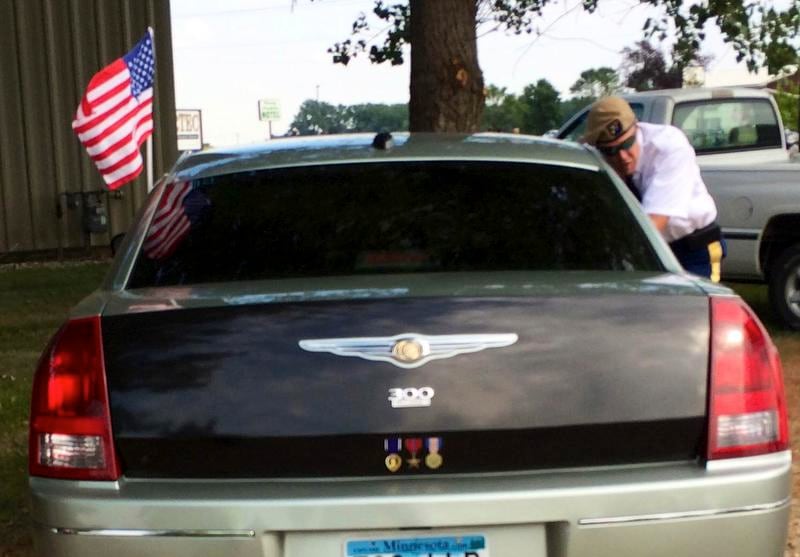
Richard Rahn shown in an Army uniform at an American Legion hall in Olivia, Minn., during a charity event. Rahn told Legion members he had served 22 years.
Photo Credit: Courtesy of Chet Blue
More public appearances
The next month, Felt, the police chief, was manning an intersection during the town's annual Willmar Fest parade when one of the military members who'd been marching offered a greeting.
"He walked by and shook my hand," the police chief said. "Hindsight is 20/20 ... we don't have a full-time military base close by, to see someone with that many decorations coming through ... your Spidey-sense is tingling."
Felt isn't a uniform expert and has no prior military service. Chet Blue does — and for him, the first red flag was the eyewear.
Taking part in the Aug. 9 KMS Ride, an annual event that honors six area soldiers killed in Iraq and Afghanistan, including Joshua Schmit, Blue pulled into the Legion post and noticed Rahn sporting a dress uniform.
But Rahn also sported Oakley sunglasses. And Blue, who deployed with a Minnesota National Guard unit to Iraq and was at the base where one of the ride's honorees lost his life, thought that given the unusual choice of frames, this high-ranking NCO deserved a second look.
Blue and his fellow riders didn't need a third: Aside from the out-of-regulation sunglasses (and a toothpick), Rahn's medal rack was out of order. His Ranger tab was sewed on. And he wore a Combat Infantryman Badge with two stars — a badge that, throughout history, could've been worn by a little more than 300 men (see "Unearned honor," above).
"I was instantly angry," said Blue, a sergeant in the Individual Ready Reserve. "If you need attention that bad, find a better outlet for it. Don't steal the valor. He's trying to present himself on the backs of people who really did those things."
A trained military policeman who wasn't in uniform for the event, Blue asked a few follow-up questions of Rahn. The answers didn't help — he remembered Rahn listing "technical sergeant" among the Army's enlisted ranks, for example.
After watching Rahn throughout the event, including his efforts to comfort some family members of the honored soldiers, Blue contacted a friend in the Guard who also serves as a policeman in Fargo, North Dakota, sharing some pictures with him that would eventually spread via social media.
Facebook groups and blogs like This Ain't Hell took the fakery to a global audience. Locally, officers tied tips from Blue and others together, and what started as a case of an impostor NCO became an arrest on multiple weapons charges.
"We feel duped, you know?" said Seydel, the Legion leader.
After the ride
During the KMS event, before the fakery fell apart, someone came up to Kim Schmit and told her a decorated soldier wanted to meet her and her husband.
"So we got up to him and he turned around, he had a toothpick sticking out of his mouth, he had sunglasses on, he was in total uniform," she said. "And he turned to my husband and he saluted. And his lip was quivering and he had tears running down his face, at least underneath his sunglasses. And he wouldn't let go of the salute until my husband returned the salute."
Her husband, wearing motorcycle gear, gave her a confused look but eventually did so, Kim Schmit said.
"It just tore me apart," she said. "And he just went on about how he'd met our family at the cemetery ... he really latched onto us."
Rahn said he wanted to give them a gift. Kim gave him her address. The next day, a box was on the front step with two military coins on the top and a small bronze statue of a praying soldier inside.
Shortly thereafter, Rahn showed up.
"He came up and he got out of his vehicle, and he was in, like, PT uniform. ... And he just said, 'I don't want to bother you people, I just want to make sure that you got the gift.' "
The Schmits invited Rahn in. He said he'd been offered a high-level post in Washington, D.C., and turned it down to stay on the front, and he was about to report back to his Fort Benning, Georgia, base to prepare for another deployment to Afghanistan.
Kim asked him about the gold star he wore on his dress uniform — whether it meant he'd lost a family member of his own in service. His answer, she said: "I wear the gold star in honor and memory of the 90 men that I've lost under my command."
Rahn left and didn't enter the Schmits' lives again until news of his arrest appeared on the Willmar Police Department's Facebook page.
"After reading [reports of Rahn's felony arrests], I thought, 'Oh, my God. He knows where we live. He's been in our home,' " she said.
Kim left a comment on the post outlining her dealings with Rahn and asking for compassion from others in the comment thread, some of whom had offered what they saw as appropriate punishment options for impersonating a soldier.
Unless investigators can show Rahn benefited financially — or in some other measurable fashion beyond ego boost — from wearing a uniform he didn't earn, charges related to stolen valor aren't likely, Felt said. The chief said his men "are beating the bushes" to find such evidence, but that any charges would come at the federal level.
"In my heart, I feel like he's not a threat," Kim Schmit said.
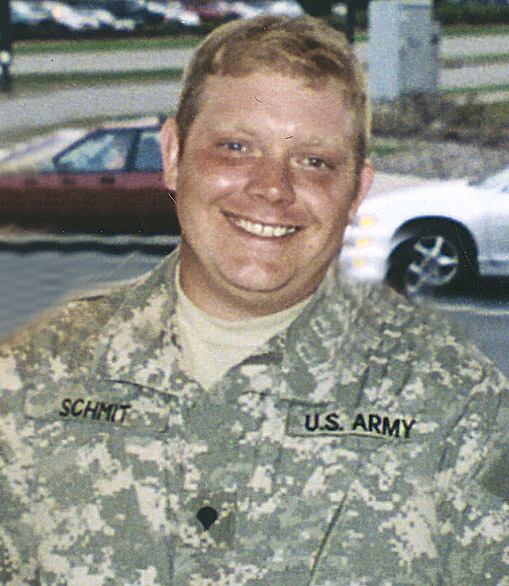
<137>In this undated photo provided by the Schmit family, Army <137>Sgt. Joshua Schmit, 26, of Willmar, Minn., was killed in 2007 by a roadside bomb in Iraq. Richard Rahn befriended Schmit's parents and claimed to be a soldier who lost 90 of his men in war. <137> Photo/Schmit family via the Tribune) ** NO SALES ** <137>
Photo Credit: AP
Rahn pleaded not guilty to the firearms charges Wednesday, according to the West Central Tribune. He's scheduled for a pre-trial hearing in January and remains in Kandiyohi County Jail, where he's had at least one visitor.
"My husband did go to the jail," Kim Schmit wrote in a follow-up email after a . 19 interview. "Greg spoke first and asked Mr. Rahn if he remembered him. At first, Mr. Rahn looked confused but then it clicked!
"Mr. Rahn ... went over to a wall where a garbage can was. My husband stated that Mr. Rahn placed his hand on the wall and leaned over the garbage can as if he were about to be sick. He then told the guard that he did not know my husband and did not wish to speak to him. So, I believe that Mr. Rahn knew that his deception hurt a Gold Star family."
UNEARNED HONOR
To wear a Combat Infantryman Badge with two stars, an individual must have seen combat during three separate, defined periods of conflict. Of the men on the unofficial "triple CIB" list maintained by the National Infantry Museum outside Fort Benning, Georgia, all received it for their roles as infantrymen in World War II, the Korean War and the Vietnam War, according to museum director Zachary Frank Hanner.
It's partially obscured in the pictures provided to Army Times, but Richard Arthur Rahn sported a two-starred CIB on Aug. 9. It was one of several uniform discrepancies noticed by participants in a motorcycle ride honoring fallen Minnesota soldiers that day.
The War Department established the CIB in 1943. The museum's list has 325 names, making the triple award a rarer achievement than the Medal of Honor for soldiers since the CIB's inception.
Kevin Lilley is the features editor of Military Times.

